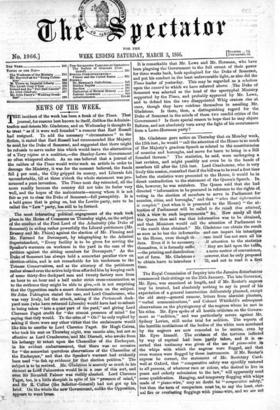The most interesting political engagement of the week took place
in the House of Commons 'on Thursday night, on the subject of the conduct of the First Lord of the Admiralty (the Duke of Somerset) in aiding rather powerfully the Liberal petitioners (Mr. Brassey and Mr. Phinn) against the election of Mr. Fleming and Mr. Ferrand for Devonport, by telegraphing to the Admiral Superintendent, "Every facility is to be given for serving the Speaker's warrants on workmen in the yard in the case of the petition against the sitting members for Devonport." As the Duke of Somerset has always held a somewhat peculiar view on election-ethics, and is not remarkable for his tenderness to the Totneas Conservatives, and as the attorney of the petitioners rather abused even the active help thus afforded him by keeping each of some thirty-five dockyard men and twenty factory men from an hour to an hour and a half under strict cross-examination as to the evidence they might be able to give,—it is not surprising that the Opposition made a smart demonstration on the subject. Sir John Pakington stated the case, and Lord Cranbourne, who was very lively, led the attack, asking if the Portsmouth dock- yard men (who have returned Liberals) would have had to submit to being taken "into a quiet part of the yard," and giving Lord Clarence Paget credit for "the utmost presence of mind" for saying that they would. To the cries of " Oh !" he only replied by asking if there were any other virtue that the exclaimants would like him to ascribe to Lord Clarence Paget. Sir Hugh Cairns, who took his seat on Thursday night, was caustic also, but not so effective as Lord Cranbourne, and Mr. Disraeli, who awoke from his lethargy to retort upon the Chancellor of the Exchequer, in his evident embarrassment, that there was no occasion for "the somewhat querulous observations of the Chancellor of the Exchequer," and that the Speaker's warrant had evidently been used "to fish up evidence for that election petition." The subject is to be revived. Mr. Gladstone is scarcely as much in his element as Lord Palmerston would be in a ease of this sort, and even Sir Bounden Palmer was visibly abashed. Lord Clarence Paget, too, is a little sheepish in spite of his "presence of mind," and Sir R. Collier (the Solicitor-General) had not got up his brief. On the whole the new'Government, unlike the Opposition, appears to want brass.






























